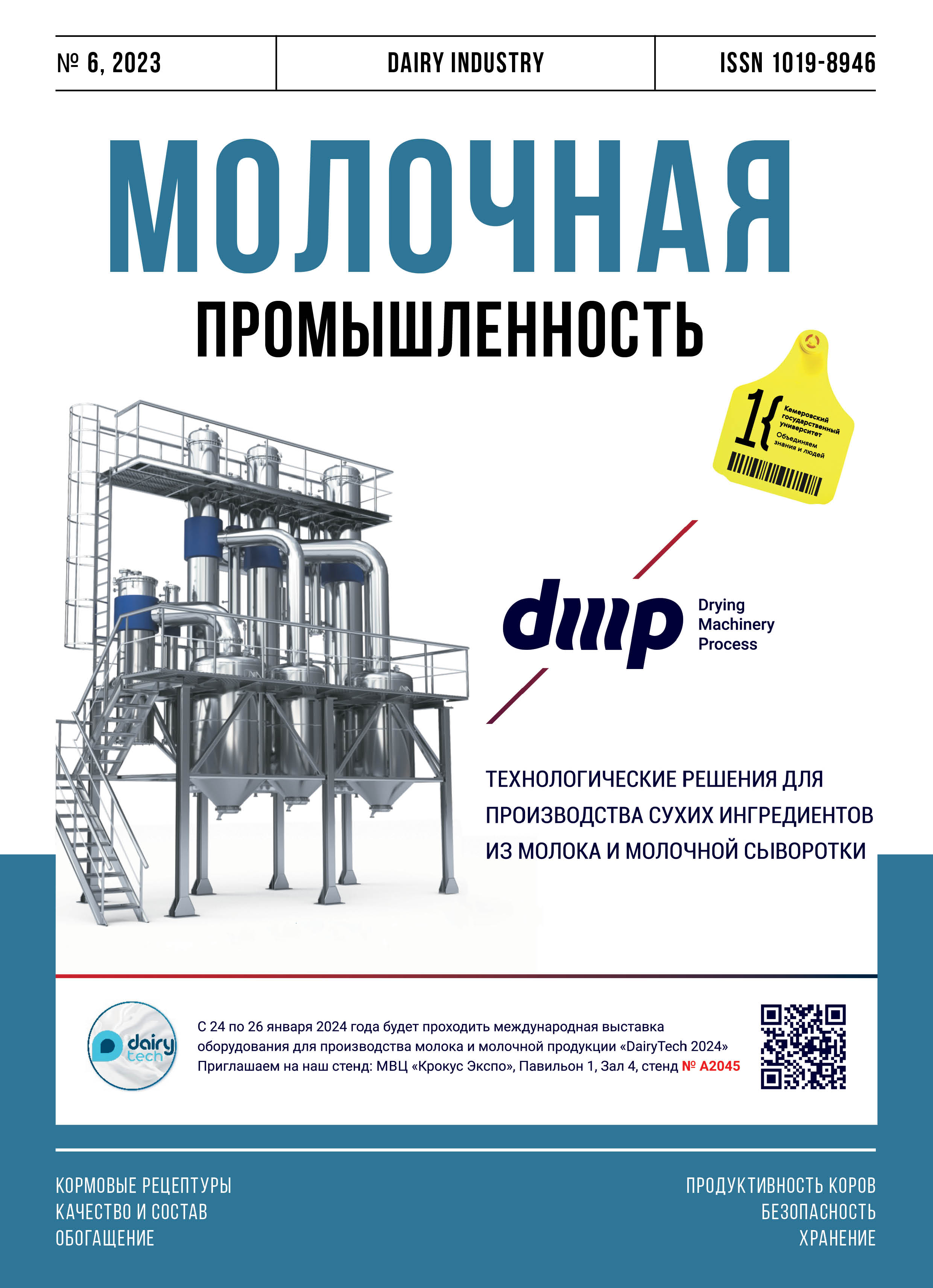Voronezh, Voronezh, Russian Federation
Voronezh, Voronezh, Russian Federation
Voronezh, Russian Federation
Voronezh, Russian Federation
Voronezh, Russian Federation
In the development of food technologies, an urgent direction is the expansion of the possibility of using natural polysaccharides, which are vital products of probiotic microorganisms formed in the process of biomass synthesis, which increase the adhesion activity of lacto- and bifidobacteria on mucous surfaces of the gastrointestinal tract and contribute to the formation of anticancerogenic, antiviral and immunomodulatory properties of probiotic products. It is known that the synthesis of water-binding metabolites by probiotic microorganisms is activated under adverse conditions for biomass growth. Experimental studies of the activity of synthesis of exopolysaccharides by a consortium of probiotic microorganisms based on Str. thermophiles, B. bifidum, B. longum, B. adolescentis, B. breve, L. acidophilus, L. plantarum, L. fermentum. The temperature modes of cultivation have been studied on the basis of combining the steps of optimal and suboptimal conditions for the development of microorganisms corresponding to temperature variation in the range of higher (47 ± 2) °C or lower (32 ± 2) °C in order to intensify the synthesis of water-binding metabolites of polysaccharide nature. It is possible to achieve lactic acid concentration sufficient for acid coagulation of the cultured mixture proteins, probiotic microorganism concentration at the level of not less than 108 CFU/g. The results of optical density studies in the range 632–643 A and exopolysaccharide concentrations for biomass samples of the consortium of lacto- and bifidobacteria within the range and 87,5–89,5 mg/mL (273–277 A and 37,5–38,5 mg/mL in the control sample, respectively) are presented. The maximum activity of synthesis of moisture-binding metabolites was found to correspond to a two-stage cultivation process at temperature (32 ± 2) °C (4–5 hours), (40 ± 2) °C (4–5 hours), followed by cooling to (4 ± 2) °C.
probiotic microorganisms, microbial metabolites, polysaccharides
1. Rajoka, M. S. R. Lactobacillus exopolysaccharides: new perspectives on engineering strategies, physiochemical functions and immunomodulatory effects on host health/ M. S. R. Rajoka, Y. Wu, H. M. Mehwish [et al.] // Trends in Food Science and Technology. 2020. Vol. 103. P. 36-48. https://doi.org/10.1016/j.tifs.2020.06.003
2. Reale, A. Tolerance of Lactobacillus casei, Lactobacillus paracasei and Lactobacillus rhamnosus strains to stress factors encountered in food processing and in the gastrointestinal tract / A. Reale, T. Di Renzo, F. Rossi [et al.] // LWT-Food Science and Technology. 2015. Vol. 60. P. 721-728. https://doi.org/10.1016/j.lwt.2014.10.022
3. Korcz, E. Exopolysaccharides from lactic acid bacteria: Techno-functional application in the food industry / E. Korcz, L. Varga // Trends in Food Science and Technology. 2021. Vol. 110. P. 375-384. https://doi.org/10.1016/j.tifs.2021.02.014
4. Silva, L. A. Exopolysaccharides produced by Lactobacillus plantarum: technological properties, biological activity, and potential application in the food industry / L. A. Silva, J. H. P. Lopes Neto, H. R. Cardarelli // Annals of Microbiology. 2019. Vol. 69. P. 321-328. https://doi.org/10.1007/s13213-019-01456-9
5. Hamagaeva, I. S. Sozdanie konsorciuma probioticheskih mikroorganizmov s vysokoĭ biohimicheskoĭ aktivnost'yu i ekzopolisaharidnym potencialom / I. S. Hamagaeva, S. N. Hazagaeva, N. A. Zambalova // Vestnik VSGUTU. 2014. № 1 (46). S. 97-102.
6. Rodionova, N. S. Differencial'no-termicheskiy analiz v ocenke ekzopolisaharidnoy aktivnosti konsorciumov probioticheskih mikroorganizmov / N. S. Rodionova, E. S. Popov, [i dr.] // Izvestiya vuzov. Prikladnaya himiya i biotehnologiya. 2018. T. 8. № 4 (27). S. 95-105.
7. Polukarov, E. V. Vydelenie ekzopolisaharidov Lactobacillus delbrueckii spp. bulgaricus pri razlichnyh usloviyah kul'tivirovaniya / E. V. Polukarov, L. V. Karpunina, D. A. Zhemerichkin // Vestnik Saratovskogo gosagrouniversiteta im. N. I. Vavilova. 2009. №. 4. S. 20-23.
8. Abramova, A. A. Razrabotka zakvaski dlya yogurta, obladayuschey nizkoy postokislitel'noy aktivnost'yu i produciruyuschey ekzopolisaharidy: dis. kand. tehn. nauk / A. A. Abramova. Moskva. 2013. 134 s.






